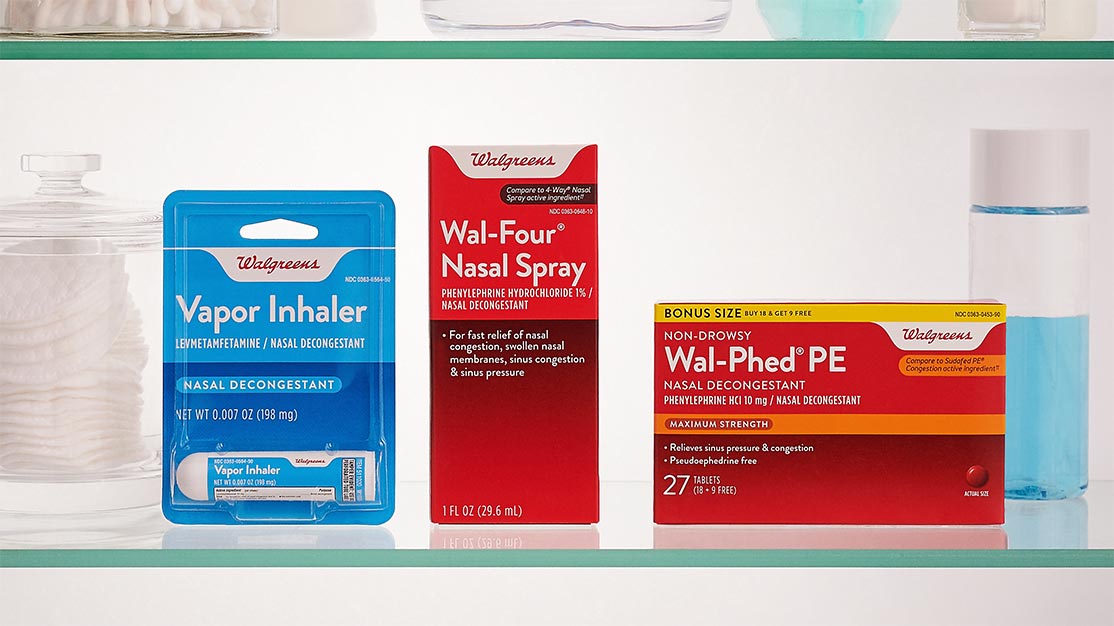Nasal Decongestants

Nearly everyone has experienced a bothersome stuffy or runny nose at some point.
Nasal symptoms can occur due to a cold, the flu, allergies, a sinus infection or other causes. No matter what's causing your congestion, you're likely eager for it to clear up, and may want to try a remedy, such as a decongestant for sinuses. Here, we'll cover how to get relief from uncomfortable nasal symptoms.
Nasal decongestant medicine
Nasal decongestants are medications that can temporarily relieve a stuffy or runny nose. They work by shrinking and drying up nasal passages. Over-the-counter (OTC) decongestant sprays, such as oxymetazoline (Afrin, Dristan) and phenylephrine (Neo-Synephrine, 4-Way Fast Acting Nasal Spray), can help ease symptoms quickly. However, it's important to only use these medications for a maximum of three days. Using nasal decongestant sprays for more than a short amount of time can cause rebound congestion (when your nose swells and stays congested unless you use the spray). It can also lead to other side effects, including nasal dryness and crusting.
Other medications for nasal congestion
There are several alternatives to nasal decongestant sprays that can also help decrease nasal symptoms. Talk to your healthcare provider or pharmacist to find the best option for you:
- Saline nasal sprays: This natural nasal decongestant helps to remove mucus from your nose. You can purchase an OTC saline nasal spray or make your own using one cup of warm distilled, sterile or previously boiled water, half a teaspoon of salt, and a pinch of baking soda. Use the nasal spray three to four times per day.
- Nasal antihistamine sprays: Prescription nasal antihistamines, such as azelastine (Astepro) and olopatadine (Patanase), can offer rapid relief of nasal congestion, postnasal drip and sneezing.
- Nasal glucocorticoids (steroids): Available by prescription and OTC (Flonase Allergy Relief, Rhinocort Allergy), nasal steroid sprays may start to work quickly, but they may not take full effect for several days or weeks.
- Combinations of antihistamines and steroids: Your health care provider may prescribe a combination nasal spray that contains azelastine and fluticasone (Dymista).
- Oral antihistamines: Prescription and OTC antihistamines, such as cetirizine (Zyrtec Allergy) and loratadine (Claritin, Alavert), can help relieve runny nose and other allergy symptoms.
- Oral decongestants: Pseudoephedrine, phenylephrine or other oral decongestants can alleviate nasal congestion.
A word on high blood pressure and other health conditions
Note that, like all medications, decongestants can cause side effects, including an increase in blood pressure. This rise in blood pressure tends to be small, but in some people, decongestants can cause a significant increase in blood pressure. Decongestants can also cause issues for people with other health conditions, including diabetes, glaucoma, heart disease, prostate problems and thyroid disease. What's more, decongestants can interfere with how well some blood pressure medications and other medicines work. If you have high blood pressure or other medical conditions, do not use a decongestant without talking to your healthcare provider first. They can recommend the best decongestant for high blood pressure or other health conditions.
Decongestants for kids
The U.S. Food and Drug Administration (FDA) recommends against the use of OTC nasal decongestants in children younger than six years of age. These medicines haven't been shown to be effective in young children, and they can cause serious side effects. If you have a child six years or older, talk to their healthcare provider before giving them a children's decongestant or other cough and cold medication.
Home remedies for nasal congestion
Medications aren't the only way to thin mucus so that you feel less congested. Try these tried and true home remedies for a stuffy or runny nose:
- Drink plenty of water.
- Apply a wet, warm washcloth to your face. Do this several times per day.
- Use a humidifier or vaporizer.
- Inhale steam two to four times per day. Try sitting in the bathroom with the shower running, but be careful that the steam isn't too hot.
While nasal congestion is an uncomfortable symptom of a cold, flu or allergies, it can often be managed with home remedies and OTC products. If these treatments don't bring you relief, or if your stuffy or runny nose is especially bothersome or accompanied by other symptoms, see your healthcare provider. They can find the cause of your nasal congestion and recommend a treatment plan.
Clinically reviewed and updated December, 2021.